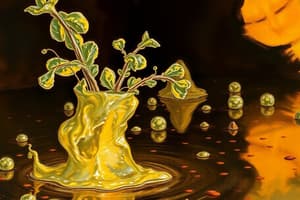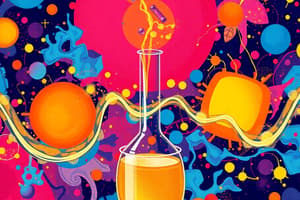Podcast
Questions and Answers
What are nonelectrolytes?
What are nonelectrolytes?
Substances that do not form ions when dissolved in water.
Which of the following are examples of nonelectrolytes? (Select all that apply)
Which of the following are examples of nonelectrolytes? (Select all that apply)
- Sodium chloride
- Sucrose (correct)
- Glycerin (correct)
- Urea (correct)
Nonelectrolytes conduct electric current.
Nonelectrolytes conduct electric current.
False (B)
What are electrolytes?
What are electrolytes?
Which of the following compounds are examples of electrolytes? (Select all that apply)
Which of the following compounds are examples of electrolytes? (Select all that apply)
What happens to the electric current in aqueous solutions of electrolytes?
What happens to the electric current in aqueous solutions of electrolytes?
Electrolytes are characterized as ___ or ___.
Electrolytes are characterized as ___ or ___.
Strong electrolytes are completely ionized in water at all concentrations.
Strong electrolytes are completely ionized in water at all concentrations.
Weak electrolytes are completely ionized in water.
Weak electrolytes are completely ionized in water.
As temperature increases, the solubilities of gases in water generally:
As temperature increases, the solubilities of gases in water generally:
What does the term 'ionization' refer to?
What does the term 'ionization' refer to?
What defines a strong acid?
What defines a strong acid?
What defines a strong base?
What defines a strong base?
What defines a weak acid?
What defines a weak acid?
What defines a weak base?
What defines a weak base?
Flashcards are hidden until you start studying
Study Notes
Nonelectrolytes
- Substances that fail to form ions when dissolved in water.
- Do not conduct electric current in aqueous solutions.
- Examples include distilled water, glycerin, urea, and sucrose.
Electrolytes
- Substances that generate ions when dissolved in a solution.
- Conduct electric current in aqueous solutions.
- Common examples are sodium chloride and hydrochloric acid.
Types of Electrolytes
- Strong Electrolytes: Completely ionized in water at all concentrations.
- Weak Electrolytes: Partially ionized in water.
Acid and Base Strength
- Strong Acids: Ionize completely in aqueous solutions.
- Strong Bases: Dissociate completely into ions in solution.
- Weak Acids: Slightly ionized in aqueous solutions.
- Weak Bases: Do not fully dissociate into ions in solution.
Gas Solubility
- The solubility of gases in water decreases with an increase in temperature.
Mollality
- Refers to the concentration of a solution expressed in moles of solute per kilogram of solvent.
Ionization
- Describes any process that leads to the formation of ions.
Studying That Suits You
Use AI to generate personalized quizzes and flashcards to suit your learning preferences.




